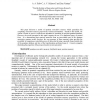Free Online Productivity Tools
i2Speak
i2Symbol
i2OCR
iTex2Img
iWeb2Print
iWeb2Shot
i2Type
iPdf2Split
iPdf2Merge
i2Bopomofo
i2Arabic
i2Style
i2Image
i2PDF
iLatex2Rtf
Sci2ools
118
click to vote
ISCI
2000
2000
Quantum associative memory with distributed queries
This paper discusses a model of quantum associative memory which generalizes the completing associative memory proposed by Ventura and Martinez. Similar to this model, our system is based on Grover's well known algorithm for searching an unsorted quantum database. However, the model presented in this paper suggests the use of a distributed query of general form. It is demonstrated that spurious memories form an unavoidable part of the quantum associative memory model; however, the very presence of these spurious states provides the possibility of organizing a controlled process of data retrieval using a specially formed initial state of the quantum database and also of the transformation performed upon it. Concrete examples illustrating the properties of the proposed model are also presented.
Related Content
| Added | 18 Dec 2010 |
| Updated | 18 Dec 2010 |
| Type | Journal |
| Year | 2000 |
| Where | ISCI |
| Authors | A. A. Ezhov, A. V. Nifanova, Dan Ventura |
Comments (0)

